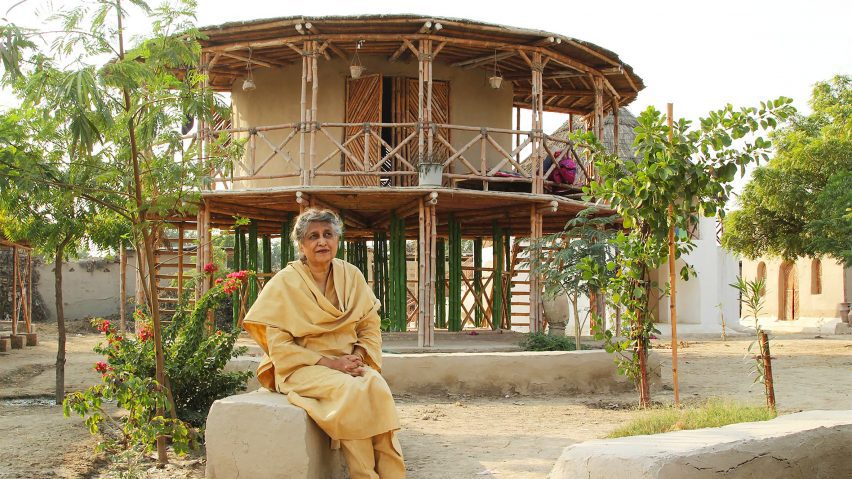Following the news that Pakistani architect Yasmeen Lari has won this year's Royal Institute of British Architects' Royal Gold Medal, we've rounded up 10 of her most notable projects.
The medal was awarded to Lari, Pakistan's first qualified female architect, in recognition of her humanitarian work since retiring in 2000.
In 1980, the architect co-founded the Heritage Foundation of Pakistan with her husband. After retiring from professional practice, she devoted herself to the foundation and to building disaster-resistant homes for some of Pakistan's most marginalised communities.
Read on for 10 key projects by 2023 RIBA Gold Medal winner Lari:
Angoori Bagh Social Housing, Pakistan, 1973
Lari designed Pakistan's first social housing scheme, Angoori Bagh, while working at Lari Associates, the architecture studio she established in 1964 at the age of 23.
The scheme included 787 dwellings for low-income families arranged into 14 clusters of single-storey, two-storey and three-storey blocks, featuring terraces that extended the living space and provided outdoor space.
Lari House, Pakistan, 1982
In 1982, Lari designed a brutalist concrete house as her own home in Pakistan.
Inside, spaces were separated by stepped changes in levels and double-height volumes were added to encourage air flow through the building.
Pakistan State Oil House, Pakistan, 1991
While at Lari Associates, Lari also designed the landmark Pakistan State Oil House building.
Two wings of the tower building were connected by a grand foyer, which featured a dramatic stepped-glass structure overhead.
Mud Brick One Room House, Pakistan, 2011
In 2011, Lari and the Heritage Foundation of Pakistan worked with local people to build a series of one-room brick houses.
The simple structures feature bamboo roofs built into brick walls, designed to be disaster-resilient and prevent collapse. The brick walls were covered in mud, which residents used to create their own designs on the front of their homes.
Women's Centre, Pakistan, 2011
The Women's Centre in Darya Khan is a cylindrical bamboo building raised on stilts to avoid flooding, which Lari described as a key example of her "second phase of life" as an architect – when she focused her attention on humanitarian work.
The centre is part of a trio of buildings designed for vulnerable people, which includes a school and a health clinic with a similar raised bamboo structure.
Pakistan Chulah Cookstove, Pakistan, 2014
This mud and lime-plaster stove was designed as an eco-friendly solution for the carbon pollution created by open-fire cooking and the health risks it poses.
Fuelled by agricultural waste like cow dung or sawdust bricks, it was created for women living in rural areas of Pakistan at increased risk of domestic fires and respiratory or heart diseases caused by preparing meals over open fires.
Find out more about Pakistan Chulah Cookstove ›
Zero Carbon Cultural Centre, Pakistan, 2017
The Zero Carbon Cultural Centre in Makli is a large pavilion with decorative bamboo screens enclosing a public space, built by local people and Lari's Heritage Foundation of Pakistan organisation.
The cultural centre serves as a social gathering space and workshop venue for people living in poor and marginalised communities. According to Lari, it is the biggest bamboo structure in Pakistan.
Find out more about Zero Carbon Cultural Centre ›
Lari Octa Green shelters, Pakistan, 2018
Lari and the Heritage Foundation of Pakistan also built bamboo shelters covered in mud on the site of the Zero Carbon Cultural Centre, to be used as lodgings for people visiting conferences at the community centre.
As part of the foundation's Green Shelter Programme to build low-cost and low-carbon housing for disadvantaged people, an additional 600 shelters were built in the surrounding villages in Makli and 400 more in Mīrpur Khās and Tando Allahyar.
Karachi re-paving, Pakistan, 2021
The Heritage Foundation of Pakistan worked with disadvantaged local communities to pedestrianise the streets of Karachi's old town with terracotta tiles.
The terracotta tiling was paved along Rahguzar Walking Street, near the 19th-century Denso Hall library, and formed part of the foundation's efforts to conserve Denso Hall and its surrounding area.
Find out more about Karachi re-paving ›
Islamic Arts Biennale pop-up mosques, Saudi Arabia, 2023
Tasked with creating a reusable mosque that could replace concrete structures for this year's Islamic Arts Biennale, Lari designed three dismantlable mosques made from bamboo that could be reassembled on different sites.
Each of the three structures featured a prayer space surrounded by a colonnade with pyramidal roofs, intending to be a more enjoyable space to pray in than the typical concrete structures erected on construction sites.
Find out more about the pop-up mosques ›

